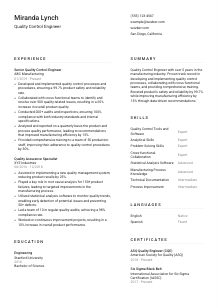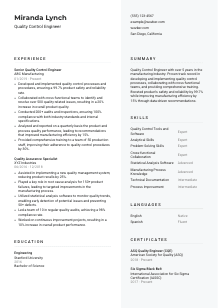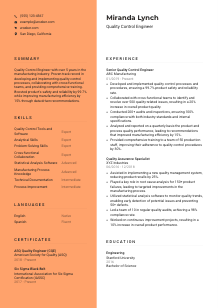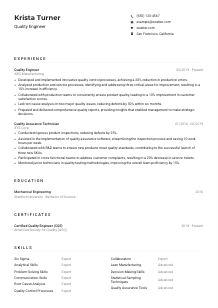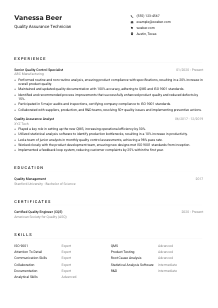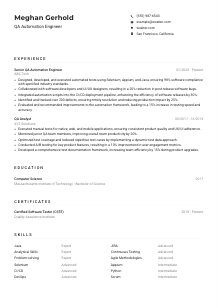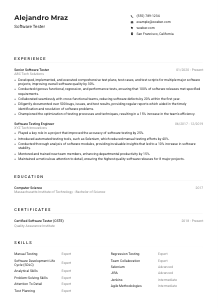Quality Control Engineer Resume Example
Sifting through production lines, but your resume feels slightly off-spec? Inspect this Quality Control Engineer resume example, honed with Wozber free resume builder. Grasp how you can calibrate your QC expertise to align with job demands, ensuring your career matches industry standards to a tee!
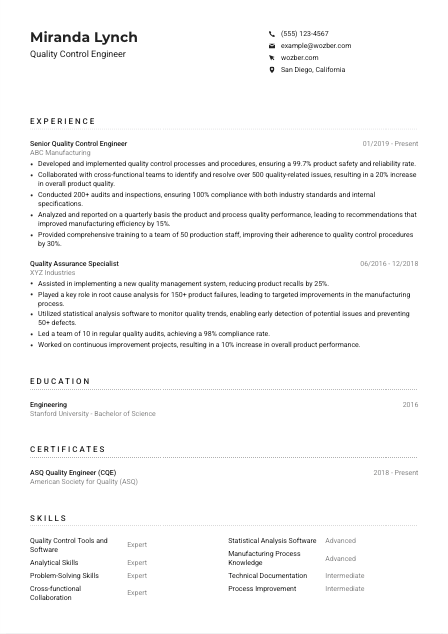
How to write a Quality Control Engineer Resume?
Hello, aspiring Quality Control Engineer! As you navigate the intricate world of quality control and engineering, your resume must stand as a testament to your expertise, precision, and dedication to excellence. This isn't just about listing your qualifications; it's about crafting a narrative that aligns with the heart of a Quality Control Engineer's role. With the help of Wozber's free resume builder, offering ATS-friendly resume formats and an ATS resume scanner for keywords optimization, you're about to transform your resume into a beacon for hiring managers.
Ready to refine your resume's precision? Let's engineer a document that speaks volumes!
Personal Details
The first block of your resume is your contact section – think of it as the coordinates that guide hiring managers to your professional doorstep. Let's optimize this section with precision to ensure it resonates with the Quality Control Engineer position.
1. Name as Your Quality Seal
Start strong with your name. It's not just a label; it's the brand that represents your professional identity. Ensure it's in a clear, professional font, setting the tone for the entire document.
2. Job Title Precision
Directly beneath your name, tailor your title to the job you're pursuing - in this case, "Quality Control Engineer." This helps frame your resume's narrative and aligns with the job description right from the get-go.
3. Communication Channels
- Phone Number: This is your direct line. Ensure it's accurate to avoid missed connections.
- Email: Use a professional format. Consider firstname.lastname as a structured approach.
4. Location Alignment
Mentioning "San Diego, California" as your location demonstrates alignment with the job's geographical requirements, subtly ticking another box in the hiring manager's checklist.
5. Professional Online Presence
Include a LinkedIn profile or personal website link. Make sure these platforms showcase a cohesive story of your professional journey, mirroring the narrative on your resume.
Takeaway
Consider this section as your resume's handshake – it should be firm, professional, and inviting. Every detail counts in setting the stage for your quality-controlled career narrative.





Experience
The experience section is where your resume starts to take shape, detailing your journey through the quality control engineering landscape. Here, precision meets prowess as you tailor your past roles to the job at hand.
- Developed and implemented quality control processes and procedures, ensuring a 99.7% product safety and reliability rate.
- Collaborated with cross‑functional teams to identify and resolve over 500 quality‑related issues, resulting in a 20% increase in overall product quality.
- Conducted 200+ audits and inspections, ensuring 100% compliance with both industry standards and internal specifications.
- Analyzed and reported on a quarterly basis the product and process quality performance, leading to recommendations that improved manufacturing efficiency by 15%.
- Provided comprehensive training to a team of 50 production staff, improving their adherence to quality control procedures by 30%.
- Assisted in implementing a new quality management system, reducing product recalls by 25%.
- Played a key role in root cause analysis for 150+ product failures, leading to targeted improvements in the manufacturing process.
- Utilized statistical analysis software to monitor quality trends, enabling early detection of potential issues and preventing 50+ defects.
- Led a team of 10 in regular quality audits, achieving a 98% compliance rate.
- Worked on continuous improvement projects, resulting in a 10% increase in overall product performance.
1. Break Down the Job Requirements
Start by dissecting the job posting. For our Quality Control Engineer position, this involves focusing on tasks such as developing and implementing quality control processes, conducting audits, and collaborating with teams.
2. Structure Your Professional Journey
List your roles chronologically, leading with your most recent position. Here, we emphasize roles that showcase direct relevance to quality control engineering, highlighting your evolution in the field.
3. Achievements Over Tasks
Shift the narrative from tasks to achievements. Instead of simply stating your duties, showcase outcomes – like improving product safety by 99.7% – to demonstrate your impact and value.
4. Quantify Success
Numbers speak louder than words. Quantify your achievements, such as "resolved over 500 quality-related issues," to provide tangible evidence of your contributions.
5. Relevance Is Key
Filter your experiences through the lens of the job description. Aligning your roles directly with the requirements, like conducting audits to ensure 100% compliance, reinforces your suitability.
Takeaway
Imagine yourself in the shoes of a Quality Control Manager reviewing resumes. Would your achievements catch their eye? Fine-tune each point to reflect the precision and analytical prowess expected from a top-tier Quality Control Engineer.
Education
In engineering, your educational background provides the theoretical backbone to your practical experience. Let's ensure your education section reflects the foundational knowledge required for a Quality Control Engineer.
1. Match the Degree Requirement
Pinpointing the educational requirement as a "Bachelor's degree in Engineering or related field" sets the stage. Ensure your degree matches these prerequisites to demonstrate your foundational knowledge.
2. Simplicity Is Clarity
Keep this section straightforward – list your degree, the institution's name, and your graduation date. The clear structure helps hiring managers quickly verify your qualifications.
3. Degree Details
For specialization, mentioning your field of study, like "Bachelor of Science in Engineering," directly aligns with the job's educational criterion, ticking another essential box for potential employers.
4. Include Relevant Courses or Projects
If you have undertaken specific courses or projects related to quality control or six sigma methodologies, listing these can add depth to your educational qualifications.
5. Showcase Other Achievements
While focusing on the degree is crucial, don't hesitate to mention honors, scholarships, or extracurricular projects that demonstrate leadership, teamwork, or dedication to the field of engineering.
Takeaway
Your education section is more than a list of schools and degrees; it's a reflection of the journey that has shaped your understanding and passion for quality control engineering. Ensure each element builds on this narrative.
Certificates
Certificates are the badges of honor in the professional world, showcasing continuous learning and specialization. Here's how to curate your certificates section for the Quality Control Engineer position.
1. Identify Relevant Certifications
The job description prioritizes Six Sigma and ASQ Quality Engineer (CQE). Highlighting these certifications places you ahead, showcasing dedication and expertise in quality control methodologies.
2. Select Pertinent Certificates
Quality trumps quantity. Choose certificates that underscore your knowledge and skills in quality control engineering, directly relaying your commitment to excellence in the field.
3. Dates Matter
Be precise with the dates of certification, especially for those with validity periods. This demonstrates not only your current knowledge but also commitment to staying updated in the field.
4. Keep Learning
The technological and methodological landscape of quality control evolves. Continuously adding new certificates and qualifications keeps your expertise sharp and relevant.
Takeaway
In quality control engineering, the pursuit of knowledge never ceases. Your certificates are a testament to your ongoing dedication to excellence.
Skills
The skills section is your professional toolkit on display. Here's how to refine it with the essential hard and soft skills required for a Quality Control Engineer, making sure it's ATS-friendly and speaks directly to the job requirements.
1. Decode the Job Listing
Start with understanding the skills highlighted in the job description. Look for both hard skills, like "Proficiency with quality control tools and software," and soft skills, such as "Strong analytical and problem-solving skills."
2. Align Your Skills
List the skills that match those requested in the job description, prioritizing them based on your expertise and the job's needs. This direct alignment assures hiring managers of your capability.
3. Organize and Prioritize
While it's tempting to list every skill you possess, focus on those that directly impact the role of a Quality Control Engineer. This conciseness ensures your most relevant skills catch the eye.
Takeaway
Consider your skills section as the highlight reel of your professional toolkit. Tailor it to showcase the expertise that positions you as the perfect fit for a Quality Control Engineer role.
Languages
In the global setting of quality control engineering, language proficiency can set you apart. Here's how to structure your languages section to showcase your communication skills effectively.
1. Assess Job Requirements
For the Quality Control Engineer role, "Strong verbal and written English skills required" signals the need for proficient English. Start by listing English and your proficiency level.
2. Highlight Your Language Skills
If you're multilingual, listing additional languages can showcase your ability to work in diverse, international teams. This demonstrates versatility beyond technical skills.
3. Be Honest With Proficiency Levels
Use clear, standardized terms like 'Native', 'Fluent', 'Intermediate', or 'Basic' to describe your language skills. This transparency helps set realistic expectations.
4. Consider the Role's Scope
If the role involves international collaboration, emphasizing your linguistic diversity can be particularly compelling, showcasing your readiness for global interactions.
Takeaway
Your linguistic skills bridge professional and cultural gaps, enriching your contributions to teams and projects. Highlight these with pride, as they enhance your professional toolkit.
Summary
The summary is your chance to captivate the audience with a snapshot of your professional narrative. Here's how to craft a summary for a Quality Control Engineer resume that's both engaging and aligned with job expectations.
1. Grasp the Job's Core
Begin by digesting the essence of the Quality Control Engineer role. Understand what makes this position tick – from quality control methodologies to team collaboration and problem-solving.
2. Start With a Strong Introduction
Open with a statement that captures your professional stance and experience. This serves as the hook that draws the reader into your story.
3. Address Key Job Requirements
Echo the job listing by integrating your most relevant skills and achievements. Demonstrating how you've leveraged these in your career reflects directly on your suitability for the role.
4. Keep It Snappy
Your summary should be punchy and to the point – a teaser that invites the hiring manager to dive deeper into your resume.
Takeaway
Your summary is the elevator pitch of your professional journey. Pack it with your career highlights and the unique value you bring to the Quality Control Engineer position.
Kickstarting Your Quality Control Engineer Career
You're now equipped to fine-tune your resume into a precision-engineered tool that showcases your expertise as a Quality Control Engineer. By following these steps and leveraging Wozber's free resume builder, complete with ATS-compliant resume formats and an ATS resume scanner, you'll cultivate a resume that stands out in the competitive landscape. Your resume is the key to unlocking new opportunities – make it reflect your dedication, precision, and passion for quality control engineering.
The path to your next brilliant opportunity starts with a click. Ready, set, engineer your future!

- Bachelor's degree in Engineering or a related field.
- Minimum of 3 years of experience in quality control or quality assurance within a manufacturing environment.
- Proficiency with quality control tools and software, including statistical analysis software.
- Strong analytical and problem-solving skills.
- Certification in Six Sigma or ASQ Quality Engineer (CQE) is preferred.
- Strong verbal and written English skills required.
- Must be located in or willing to relocate to San Diego, California.
- Develop and implement quality control processes and procedures to ensure product safety and reliability.
- Collaborate with cross-functional teams to identify and resolve quality-related issues.
- Conduct regular audits and inspections to ensure compliance with industry standards and internal specifications.
- Analyze and report on product and process quality performance, making recommendations for improvement.
- Provide training and support to the production team on quality control procedures.





